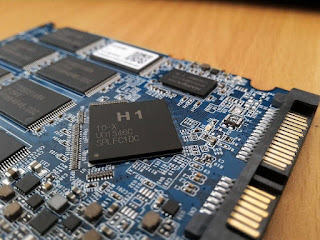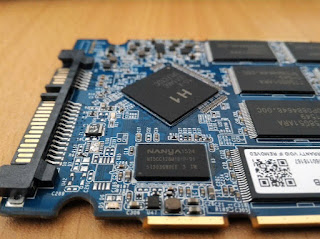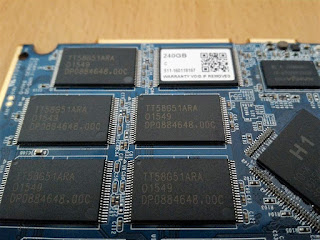Introduction
 |
| Sony SLW-MG2 |
The new Sony SLW-MG2 is their first attempt into the SSD market. With a review unit available, we wanted to put the unit to the test, and find out how well can this SSD perform. We also wanted to find out if these drives can bring real value to consumers and if it live up to its stated specifications. Moreover we want to determine if the attractive S$139 price tag on the 240GB model is a real deal.
Technical Specifications
Like many of the newer hard drives and SSDs, the Sony SLW-MG2 has a much slimmer profile. This slim profile allows new laptops out in the market to be thinner and lighter. In order to make sure that it is compatible with all devices out in the market, Sony has also included a spacer within the package to increase the height of the SSD.
As technical geeks, we were curious to find out the hardware used within the SSD that allows such promised speeds. The first thing we noticed with this SSD was that it was using a reference design by an OEM manufacturer. In fact, this means that the Sony SLW-MG2 is in fact a generic solution that is only branded by Sony, but not fully manufacturer by Sony themselves.
The storage controller show here was unknown to the internet. Searching up its model code did not yield any result, but based on the specifications, we can deduce that this is a Phison PS3110-S10 controller. Do note that this is only our speculation. This controller is also used in Corsair’s Neutron XT, which explains the similarity in performance.
The Sony SLW-MG2’s performance is further enhanced with an additional Nanya commercial grade 128MB DDR3(L) as a buffer cache. This allows faster transfers between the SSD and host computer for recently used data. This cache runs at a speed of 1600MHz 11-11-11 latency, fairly similar with the actual speed of the computer’s main memory, ensuring even lower delays between transfers.
The main storage memory unit in the SSD is provided by Toshiba. As this is a fairly new SSD, it uses a newer 15nm Toshiba TLC. This differs from Corsair alternative, which was using an previous 19nm technology memory IC. A total of 8 x 32GB memory ICs give the SSD a total physical capacity of 256GB (240GB).
Benchmark
Although there are many tests that a SSD can go through to determine its actual performance, we are only going to focus on its maximum attainable speeds. This is used to compare with the stated specifications from Sony.
Test Setup :
1. Intel Pentium G3258 Anniversary Edition
2. ASUS Maximus VI Gene
3. OCZ 1600MHz RAM
4. Samsung 840 256GB SSD (OS)
5. Windows 10 64bit
ATTO Disk Benchmark results certainly look promising the Sony SLW-MG2 was able to reach speeds of above 500MB/s on both read and writes when it was handling multiple small 32KB data sizes. The maximum attainable speed through the test was 564.467MB/s read and 538.066MB/s for write. This result far exceeds many other SSDs in the market.
A similar yield of results were attained on CrystalDiskMark, confirming that the SSD lives up to its expectations.
Final Thoughts and Conclusion
It was seen as an erratic move from Sony to enter the SSD market, which is largely dominated by memory manufacturers like Samsung and Micron. Sony was probably trying to test the waters with the name of their brand, in order to reach out consumers who are not in the tech scene. The first SSD product “from” Sony hits the sweet spot between performance and price.
By providing a good value to consumers who wants to hop onto the SSD bandwagon, the Sony SLW-MG2(240GB) or SLW-MG4(480GB) will be a good choice. It performs up to expectations and is comparably easy on the wallet. Therefore, we will definitely recommend this new SSD if you are looking for something to improve your computer’s performance.
Available in two capacities, 240GB (SLW-MG2) and 480GB (SLW-MG4), the new SLW-M internal SSD is now available at all Sony Stores at the recommended retail prices of S$139 and S$259, respectively.
For the LATEST tech updates,
FOLLOW us on our Twitter
LIKE us on our FaceBook
SUBSCRIBE to us on our YouTube Channel!














